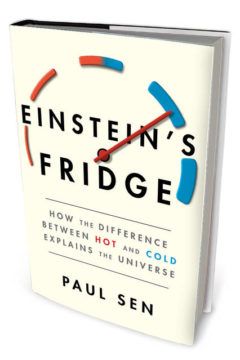Philip Ball in Physics World:
 Like many science writers, I have often adopted the conceit that quantum mechanics and general relativity are our two principal (if incompatible) theories of the physical world. With his superb new book Einstein’s Fridge: the Science of Fire, Ice and the Universe, documentary filmmaker Paul Sen has made me doubt that this is the right way to express it. Those two theories might be better positioned as the terms of engagement with the universe: relativity describing the backdrop of space–time, and quantum theory giving a fine-grained account of the stuff within it. But to explain what we actually see happening amid all the teeming particles, we are better served by the subject of Sen’s book: thermodynamics, in all its guises.
Like many science writers, I have often adopted the conceit that quantum mechanics and general relativity are our two principal (if incompatible) theories of the physical world. With his superb new book Einstein’s Fridge: the Science of Fire, Ice and the Universe, documentary filmmaker Paul Sen has made me doubt that this is the right way to express it. Those two theories might be better positioned as the terms of engagement with the universe: relativity describing the backdrop of space–time, and quantum theory giving a fine-grained account of the stuff within it. But to explain what we actually see happening amid all the teeming particles, we are better served by the subject of Sen’s book: thermodynamics, in all its guises.
Einstein’s Fridge offers an accessible and crystal-clear portrait of this discipline’s breadth, largely told through its history. Beginning as an attempt to understand and improve the machinery of the Industrial Revolution, thermodynamics soon provided the most profound of what physicists today call no-go theorems – statements about what is physically impossible – in the form of the first two laws of thermodynamics. First, energy is conserved in the universe; second, in all that comes to pass, some energy is unavoidably dissipated into a form that cannot be used to do work. From those ingredients, 19th-century scientists realized that we can make deductions about the beginning of the universe (it must have had an unlikely, low-entropy configuration) and its end (in a “heat death” of useless energetic uniformity).
Thermodynamics tells us everything from the prosaic (why ice cream melts), to the global (what powers the engine of the world’s climate system) and even the cosmic (why the Big Bang has left a pervasive microwave background hum).
More here.
